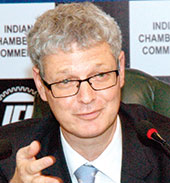 Noida, Feb 24: Israel has invited Indian companies to take part in extracting natural gas from its newly-found reserves, with 40 percent of the produced hydrocarbon reserved for exports, even as it wants talks on a free trade pact to fructify soon.
Noida, Feb 24: Israel has invited Indian companies to take part in extracting natural gas from its newly-found reserves, with 40 percent of the produced hydrocarbon reserved for exports, even as it wants talks on a free trade pact to fructify soon.
Israeli Ambassador to India Alon Ushpiz said his country will soon emerge as one of the biggest producers of natural gas and is willing to export it to India, which imports around 80 percent of its oil needs mostly from the Persian Gulf countries.
"Our plan is to keep 60 percent of the produce for domestic use, while the remaining 40 percent will be exported," Ushpiz said during an interaction , adding: "India, being one of the largest importers, will be the natural target."
The offshore gas reserves in the Mediterranean Sea, which extends from the coasts of Israel, Lebanon and Syria in the east to Cyprus in the west, is estimated to hold 122 trillion cubic feet of natural gas and 1.7 billion barrels of oil - the biggest discovery in 10 years.
"Our plan is to keep 60 percent of the product for domestic use, while the remaining 40 percent will be exported," said Ushpiz, adding that India, being one of the largest importers, will be the natural target market.
A consortium led by Houston-based Noble Energy is developing the Tamar field in the Mediterranean Sea, located nearly 90 km west of Israel's port city of Haifa. Supply of gas from Tamar started in March 2013 for Israel's domestic use.
Another field named Leviathan in the Mediterranean Sea is also being developed by the Noble Energy-led consortium. The production is expected to start by 2017.
Ushpiz said Israel would be happy to see Indian companies' participation in these gas fields. "Any Indian company is free to participate, private or government-run." But he clarified that the country bars any company that has dealings with Iran.
Besides energy, the ambassador said, Israel is keen to enhance cooperation with India in other sectors like information technology, defence, water management and agriculture.
With a view to supporting joint technological ventures, Israel and India recently agreed to set up a $40 million joint fund. Both the countries will contribute $20 million each to the fund over a period of five years.
Ushpiz said Israel is keen to further enhance the corpus of the fund and also encourage private participation in it.
On the ongoing talks for a free trade agreement, Ushpiz said: "It's a very complicated set of negotiations. It has been going on for more than three years now. Unfortunately, so far, we have not been able to conclude the negotiations."
But once the agreement is signed, India-Israel bilateral trade could rise three-fold in three -five years, the ambassador stated at the office.
"The agreement is a strategic game changer to what we can and should do together. The minute we have a free trade agreement, the volume of trade is going to be much bigger. It is going to be larger by two-three fold in three-five years," he said.
"It will also change the composition of trade and remove the focus from the traditional things that we may be doing for the past 10 years to things which we should do together with high technology," the ambassador added.
India-Israel trade stood at $4.44 billion in 2012, down 14.3 percent from the previous year's $5.19 billion due to a slowdown. The balance of trade was in Israel's favour by $573 million, according to data available with India's external affairs ministry.
In the first nine months of 2013, the two-way trade stood at $3.24 billion.





Comments
Add new comment